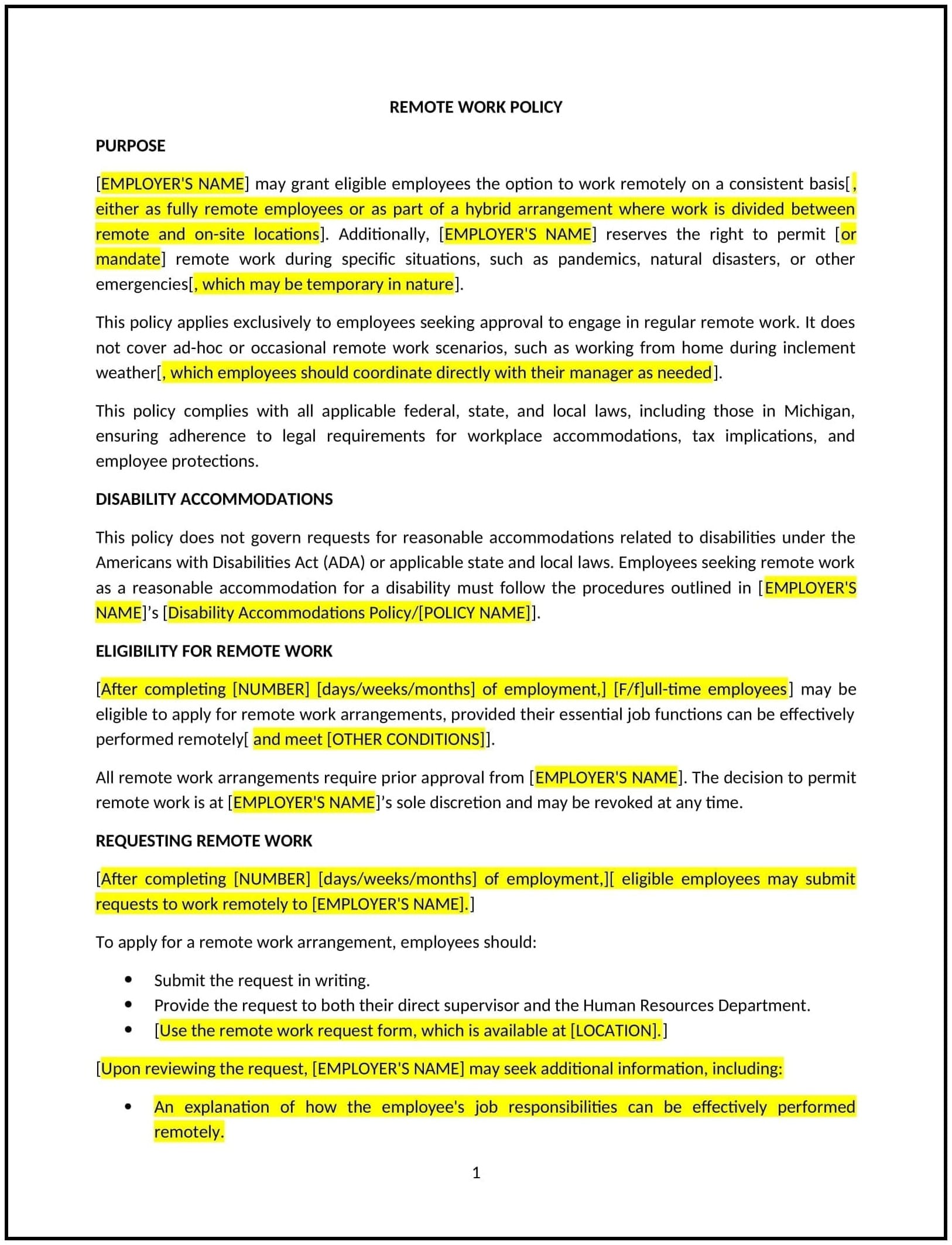Got contracts to review? While you're here for policies, let Cobrief make contract review effortless—start your free review now.

Customize this template for free
Remote work policy (Michigan)
A remote work policy establishes the guidelines for Michigan businesses on allowing employees to work from locations outside of the traditional office, such as their home or another remote location. This policy outlines expectations for work hours, communication, performance, equipment, and data security while working remotely. It helps businesses set clear parameters to ensure that remote work is productive, efficient, and aligned with business goals.
By implementing this policy, businesses can offer flexibility to employees, enhance work-life balance, and maintain productivity while protecting company assets and ensuring compliance with legal and regulatory requirements.
How to use this remote work policy (Michigan)
- Define eligibility for remote work: Outline the criteria for employees to be eligible for remote work, such as specific roles, length of employment, or performance metrics. Specify whether remote work is available full-time, part-time, or on a case-by-case basis.
- Set expectations for work hours: Clearly define work hours and whether employees are expected to maintain a set schedule or have flexibility in their working hours. Specify time zone expectations and any required overlap with team members for collaboration.
- Outline communication guidelines: Specify the tools and methods of communication employees should use while working remotely, such as email, video calls, messaging apps, or project management tools. Set expectations for response times and availability during work hours.
- Define performance expectations: Establish clear performance goals and expectations for remote employees, including deliverables, productivity, and quality of work. Consider using metrics such as completed tasks, project deadlines, or customer satisfaction to track performance.
- Address equipment and technology: Specify who provides and maintains the necessary equipment for remote work, including computers, software, and internet access. Address the responsibility of employees to keep their work environment safe and equipped for remote work.
- Ensure data security: Implement guidelines for safeguarding company data while working remotely, such as using secure Wi-Fi connections, encrypting sensitive documents, and following company policies for data protection. Ensure employees use company-approved devices and software.
- Set boundaries between work and personal life: Encourage employees to create boundaries between work and personal time to prevent burnout, especially when working from home. Offer flexibility to ensure employees can manage their work-life balance.
- Monitor and review remote work arrangements: Regularly check in with remote employees to assess the effectiveness of the arrangement and address any challenges. Conduct performance reviews to evaluate how remote work is impacting productivity and employee satisfaction.
- Ensure compliance with Michigan labor laws: Ensure that the remote work policy complies with Michigan state labor laws, including wage and hour regulations, and federal regulations such as the Fair Labor Standards Act (FLSA) for exempt and non-exempt employees.
- Review and update regularly: Periodically review and update the policy to ensure it remains relevant to changing business needs, employee feedback, and legal requirements.
Benefits of using this remote work policy (Michigan)
This policy provides several key benefits for Michigan businesses:
- Increases employee flexibility: Offering remote work options provides employees with the flexibility to work from home or another location, improving work-life balance and job satisfaction.
- Enhances productivity: Remote work can increase productivity by allowing employees to work in an environment where they are most comfortable and efficient, reducing commuting time and office distractions.
- Reduces overhead costs: By allowing employees to work remotely, businesses can reduce the costs associated with maintaining office space, utilities, and other resources.
- Attracts and retains talent: Offering remote work opportunities can make the business more attractive to job candidates, especially those seeking flexibility, and can help retain top talent by meeting employees' needs for a better work-life balance.
- Ensures business continuity: Remote work allows businesses to maintain operations during disruptions, such as bad weather or health emergencies, ensuring continuity of business activities.
- Complies with legal requirements: By implementing clear remote work guidelines, businesses can ensure compliance with Michigan state laws, federal labor laws, and regulations concerning employee rights, wage laws, and data protection.
Tips for using this remote work policy (Michigan)
- Communicate the policy clearly: Ensure all employees are aware of the remote work policy by including it in the employee handbook, during onboarding, and through regular updates.
- Provide necessary tools and resources: Ensure remote employees have the necessary equipment, software, and training to perform their tasks efficiently. Offer ongoing technical support for troubleshooting any issues.
- Set expectations for communication: Ensure remote employees are clear on communication expectations, such as daily check-ins, availability during work hours, and response times. Use collaboration tools to maintain constant communication and teamwork.
- Monitor employee well-being: Check in regularly with remote employees to ensure they are managing their work-life balance and are not experiencing burnout. Encourage employees to take breaks, maintain healthy routines, and stay connected with colleagues.
- Foster a strong company culture: Even when working remotely, encourage employees to engage with the company culture through virtual team-building activities, meetings, or social events. This helps maintain a sense of belonging and connection to the organization.
- Review the policy regularly: Regularly assess the remote work policy to ensure it continues to meet the needs of employees and the business. Adjust the policy based on feedback and changing work conditions.